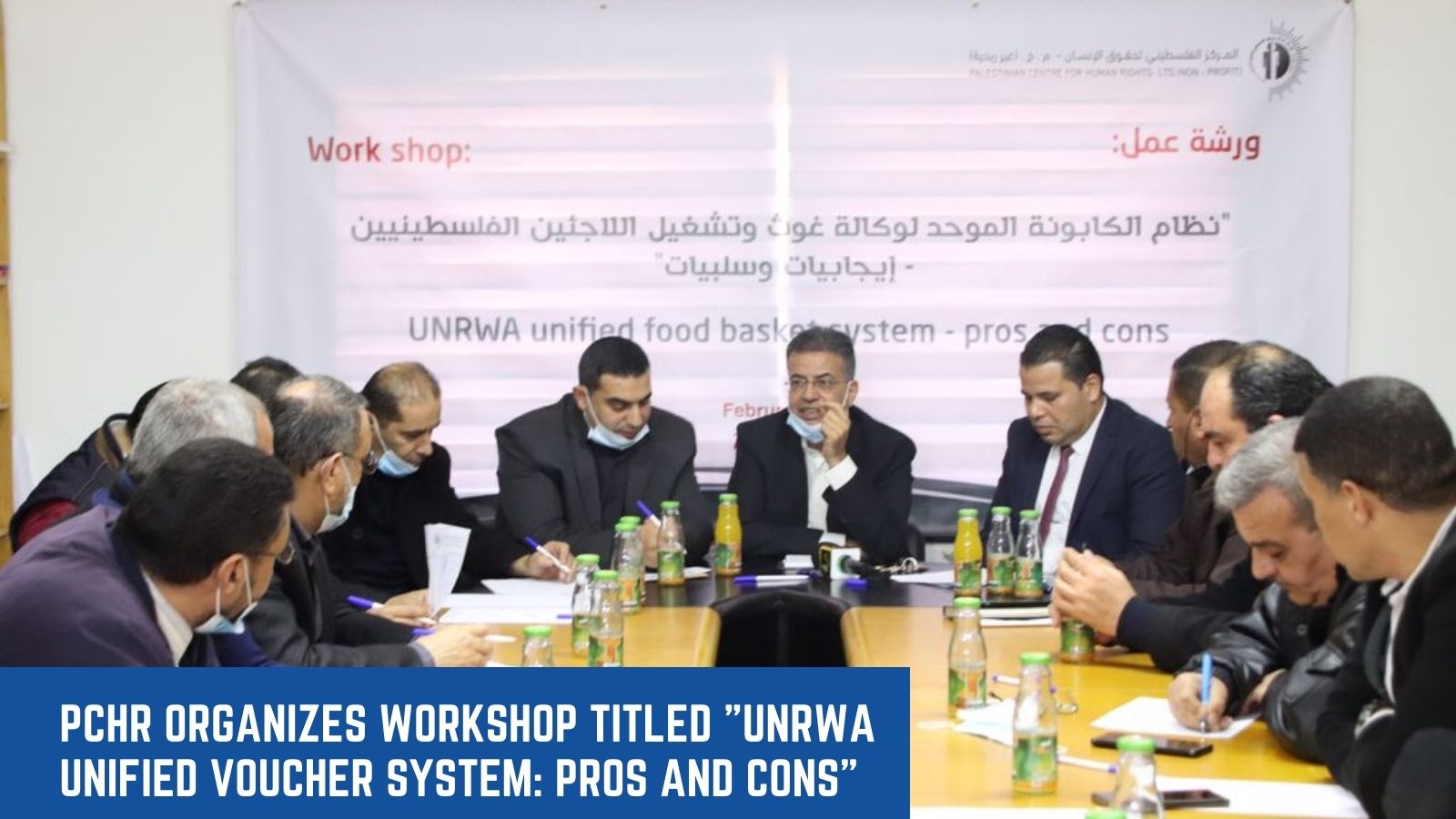
Ref: 17/2021
Date: 25 February 2021
The Palestinian Centre for Human Rights (PCHR) organized at its head office in Gaza City a workshop titled “UNRWA Unified Voucher: Pros and Cons.” The workshop was attended by heads and members of popular refugee committees in the Palestinian refugee camps in the Gaza Strip, representatives of the United Nations Relief and Works Agency (UNRWA), the Refugee Affairs Department at the Palestinian Liberation Organization (PLO), civil society organizations and media. The workshop discussed the repercussions of replacing the yellow voucher for the abject poor with a unified food basket system.
Dr. ‘Azzam Sha’ath, a researcher at PCHR’s Economic and Social Rights Unit, opened the workshop by welcoming the participants and reviewing the press release issued by PCHR on the new system approved by UNRWA to distribute aids to the refugees in the Gaza Strip. He emphasized the Palestinian refugees’ right to have their basic services provided by UNRWA out of the latter’s responsibility towards them. He calling for proper mechanisms to support the refugees in light of their suffering due to the Israeli-imposed closure and international division, hoping that the new system will not be at the cost of the abject poor refugees.
‘Adnan Abu Hasnah, UNRWA’s Media Advisor, addressed the reasoning behind the unified voucher system by saying that UNRWA has become unable to differentiate between the poor in light of the increase in Gaza’s poverty rates. He added that the decision to apply the new system was issued according to researches recently done by UNRWA’s social researchers (around 800), showing that the poor segment has recently expanded, especially after the outbreak of Covid-19. He added that around 100,000 persons are waiting to get food assistance, rendering UNRWA incapable of helping them; either the old system continues and they will be excluded or a new system is adopted where UNRWA becomes capable of providing aid to all, that is, a total of 1,200,000 beneficiaries according to the new system.
Regarding the latest developments, Abu Hasnah said that UNRWA has worked on fixing the unified food basket for all but with a little change on its contents; some of which may be replaced upon the nutrition experts’ recommendation to guarantee that refugees benefit from these aids. He also emphasized that UNRWA is currently working on obtaining governmental databases that would enable it to sift the numbers of beneficiaries according to their entitlement so that new names benefit. He added that UNRWA already suffers a financial crisis and seeks to overcome it when the next international conference comes as many donors pledged a multi-year fund to maintain financial stability and continuous provision of services.
Mr. Rami al-Madhoun, Representative of PLO’s Refugee Affairs Department, said that UNRWA introduced the term of “absolute poverty” and attempts to treat its crises at the expense of those classified under the abject poverty, calling on UNRWA to work together with the refugee community to reach solutions that would promote UNRWA’s regular budget and not the emergency one like it currently happens. Al-Madhoun stressed that UNRWA is targeted and there are attempts to downsize its programs gradually in light of the deteriorating humanitarian conditions of the refugees in Gaza as around 68% of the Gaza population suffers from food insecurity, urging the UNRWA to be more flexible when considering the criteria set to choose the beneficiaries, particularly patients and the abject poor. He added that UNRWA should have made the yellow voucher- double portions food basket for all refugees in Gaza and not vice versa.
The participants at the workshop recommended that the Palestinian refugee has the right to food assistance according to clear criteria that do not affect the abject poor. The participants demanded the following: